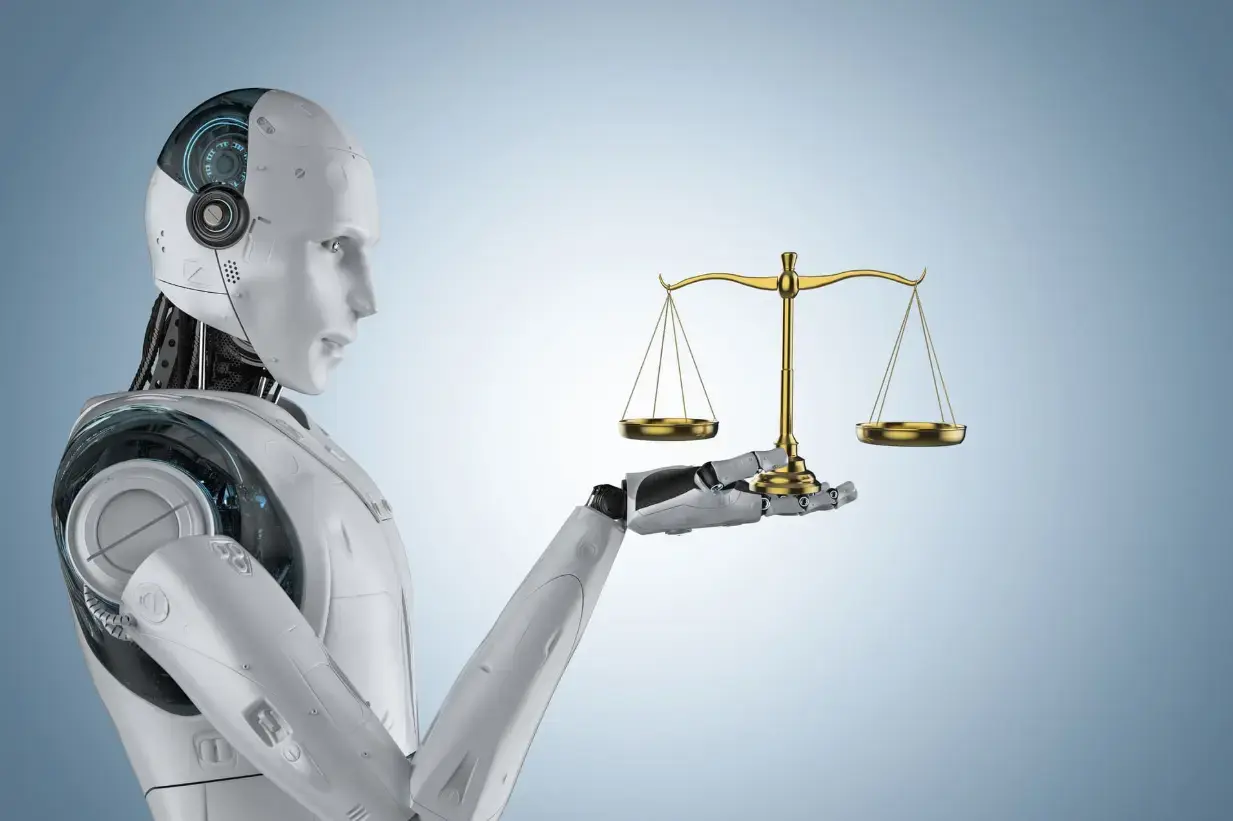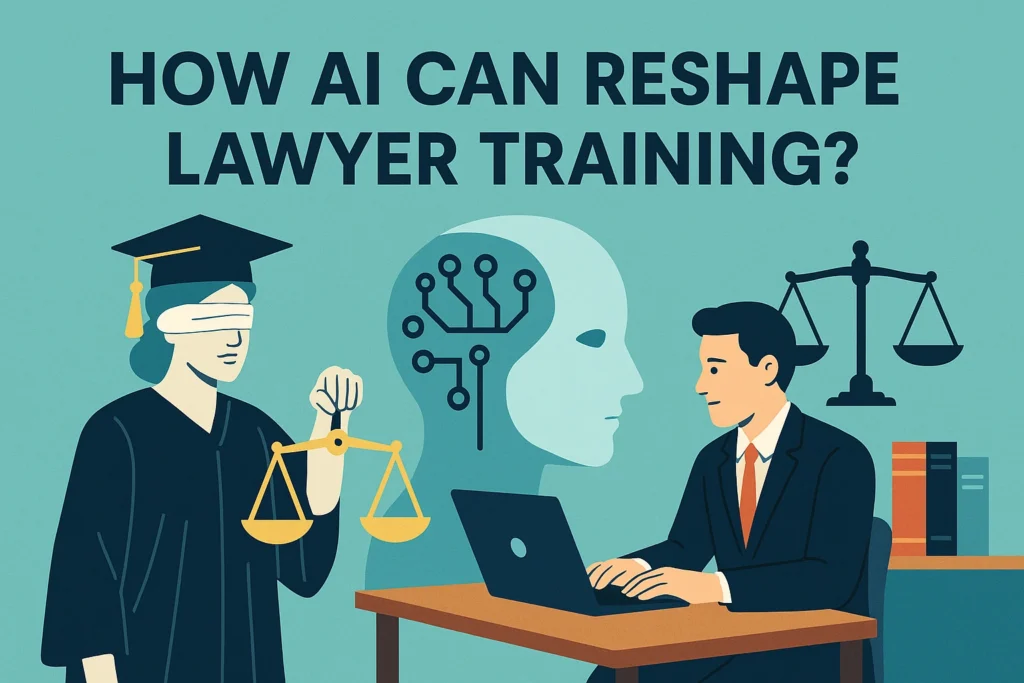The Legal Profession Doesn’t Have an Education Issue—It Has a Speed Issue.
Let me tell you.
Law is evolving quicker than it ever has. New laws, complicated tech-case issues, and mounting digital paperwork each day.
And yet?
A lot of lawyers are still educated with the same old processes employed 20 years ago. Endless books. Lecture-only education. Not much practical application.
The consequence?
New lawyers are entering the industry overwhelmed, under-skilled, and without knowing how to do actual-life legal work in an efficient manner.
But here’s the really interesting stuff:
AI in lawyer training is stepping in, and it’s not simply changing the game. It’s rewriting the rules.
Why Traditional Lawyer Training Needs a Shift
The educational system for law was designed for times when laws evolved at a slow pace and computers served optional needs alongside printed textbooks in class.
Now, though?
Customers anticipate quicker responses. Each legal case today deals with data privacy matters and AI regulation together with cybersecurity aspects and additional topics. Legal educational institutions persist in their practice of using outdated teaching methods which depend mainly on traditional lectures and antiquated textbooks while providing minimal access to practical tools.
Law firm leaders, as reported by Bloomberg Law in 2023, indicated through a survey that more than 65% of them consider recent graduates insufficient for practical law work.
Not only is that inconvenient. It is expensive.
The practice of retraining legal associates has become longer and more financially demanding for employers. Young lawyers struggle to move from classroom knowledge to practical workforce expectations while attempting to fill the gap.
The legal industry demands educational approaches that keep pace with the speed of resolving its hired problems.
Role of AI in Lawyer Training Today
The employment of artificial intelligence in lawyer training education is currently used by leading law firms as well as innovative legal institutions to improve lawyer education.

AI Legal Research Platforms Speed Up Learning
Students who use Lexis+ AI along with Casetext can perform authentic legal research initiatives. The process of extracting significant case precedents and conducting case analysis now takes students only a few minutes through AI learning platforms.
Contract Analysis Tools: Teach Smarter Review
Through technology like Kira Systems and Luminance, students can process many contracts to learn AI identification of essential points, risky conditions, and uncommon terms essential to corporate law practice.
AI Simulations and Chatbots Build Real-World Skills
The education sector combines AI simulation capabilities to reconstruct the specific processes of client interviews and counseling sessions along with intake procedures. The tools enable learners to develop critical thinking skills together with empathy while spotting important issues within controlled simulated environments.
Writing Assistants Give Instant Feedback
AI writing tools assess how well a text is structured in addition to its tone and citation methods, and clarity levels, which results in instant guidance. When used for legal writing training, the system enables students to improve their skills through multiple iterations without needing instructor supervision.
Boosted Productivity in Real Legal Settings
Thomson Reuters data showed that companies using AI during training achieved up to a thirty percent enhanced associate performance and a twenty-five percent increase. Problem-solving opportunities during daily work enable learners to receive guidance from intelligent systems instead of classroom sessions or review cycles.
Benefits of Integrating AI in Lawyer Training
Using artificial intelligence during legal education goes beyond accessing fashionable equipment because it provides solutions to persistent educational obstacles that lawyers have encountered for numerous years. The main advantages can be explained as follows:
Faster Skill Development
AI-powered tools grant students and junior lawyers immediate feedback, which enables them to make instant corrections on their work. Learners experience immediate feedback because they do not need to wait the typical days spent on the professor’s review of briefs.
Personalized Learning Paths
Everybody learns uniquely. The performance tracking system of AI adapts content delivery for each user so they can spend more time strengthening weak points and bypass topics they have already mastered. Neota Logic provides users with personalized legal learning flows through its toolset.
Practice-Ready Legal Training
AI systems duplicate authentic legal duties through activities such as contractual evaluation and research to teach students work-level abilities efficiently. On your first client job, you will not have to keep “learning the hard way.”
Cost-Effective Legal Education
Firms, together with law schools, reduce their costs through robotic training implementation. A single AI solution educates numerous learners while supporting instructors and generating standard results at every step.
Scalable Pro Bono Training
Pro bono projects, together with nonprofits, use AI solutions to increase their benefits. The organization Pro Bono Institute implements AI tools to deliver large-scale training to volunteers, which results in clients getting legal assistance of higher quality.
Begin your AI-powered legal change right now.
Real-World Applications of AI in Lawyer Training
Through active implementation, AI has started reshaping the actual training environment for lawyers:
Law Schools Using AI Tools in the Classroom
Northwestern and Harvard schools now use AI research platforms, mock trial simulations, along with virtual clinics to provide a pre-graduation student experience.
Law Firms Onboarding Associates With AI Support
Allen & Overy, together with other top firm,s employ AI systems to provide AI-driven training for new associates concerning contract drafting alongside compliance checks and research operations thus speeding up entry programs.
Hybrid Learning Programs with Built-In AI
Through Thomson Reuters Learn, students can experience identical educational outcomes while studying remotely and in-person due to the AI system monitoring their advancement and testing them for instant evaluation purposes.
Pro Bono Projects Using AI to Train Volunteers
AI-based checklist assessments, along with chatbots and decision trees, enable the training of legal aid volunteers to screen clients and identify cases while providing better assistance without additional legal certifications.
Overcoming Resistance to AI in Lawyer Training
Law firms struggle with implementing AI systems during lawyer development processes, yet few people know how to address this challenge today.
The growing acceptance of AI in lawyer training meets resistance from several professionals, which is reasonable to understand.
Fear of Job Replacement
One of the main concerns? “Will AI take my place?”
Artificial intelligence functions as an aid tool for lawyers who wish to maintain their professional roles in modern society. The system takes over monotonous duties which permits attorneys to tackle crucial human capabilities including strategic planning application of judgment and advocacy responsibilities.
Lack of Tech Confidence
Lawyers from many different backgrounds did not receive any training in technology. The introduction of AI tools to a firm creates an overwhelming experience for everyone. The answer? Begin small. Modern AI education tools involve basic training which enables everyone in the office to participate equally.
Ethical and Privacy Concerns
Data protection concerns and worries about AI delivering improperly programmed decisions emerge from lawyers. Legal AI tools now incorporate essential features of privacy and compliance, and transparency at their core design stage.
A 2024 Verbit survey found that after receiving the right training and being aware of the ethical limits of AI, 72% of lawyers felt more comfortable utilizing it.
Cultural Resistance in Law Firms
Several senior partners continue to work from their established traditional methods. It can feel dangerous to change. Staff members from AI-training-adopting firms worked with greater team efficiency and displayed decreased burnout symptoms among their junior personnel. Actual benefits contribute to the dissolution of resistance from people.
Use reliable AI to transform legal ambiguity into clarity.
Future Outlook: How AI Will Continue to Evolve Legal Training
Legal technology innovations speed up daily yet artificial intelligence training for lawyers holds many more opportunities to develop.
Fully Immersive Training Simulations
Lawyers in training will adopt courtroom abilities through Virtual Reality headsets, which receive immediate feedback about their speaking voice, legal presentations, along facial movement controls from Artificial Intelligence programs. Experimentation with this system already appears in initial program trials.
Predictive Learning Paths
AI technology will gradually detect training deficiencies when they emerge into problems. The system detects your difficulty with negotiation logic so it redirects your learning toward that skill set in the same way as an individual personal legal coach.
24/7 AI Mentors
First-year law professionals no longer need to wait until the start of the week to receive feedback. AI facilities enable them to obtain instantaneous responses regardless of their late court preparations.
Integration with Continuing Legal Education (CLE)
The introduction of AI does not eliminate CLE, while it brings intelligent capabilities to its operations. The CLE training modules will adjust pace naturally while presenting scenarios for learning activities and producing immediate certification upon completion.
Use Heyeve’s AI-powered mock trial simulations to virtually enter the courtroom.
Final Thoughts: Embracing the Change in Legal Training
The traditional law practice, together with legal education, no longer remains identical to its original form.
Modern legal practices have outrun the effectiveness of traditional lecture-based education combined with textbook learning. AI in lawyer training provides benefits beyond gap fixes because it establishes a superior educational foundation.
The implementation of AI technology enhances legal training by producing professionals who gain knowledge and actual vocational skills through personalized education procedures with real-time assessment systems.
And the best part?
To begin the process, you need nothing more than openness instead of superior technological skills. All you have to do is be honest.
No future is coming where legal training needs to keep tech separate from tradition, so we should construct superior training methods by combining both.
How is AI currently being used in lawyer training programs?
Law schools and law firms utilize AI for legal research tools, contract automation software, client question simulations, attorney writing toolkit solutions, and student and employee admission processes.
Can AI replace human-led legal education?
The educational support AI provides to legal instruction continues to serve alongside human mentorship, ethical discussions, and nuanced human judgment.
What are the risks of using AI in legal education?
The use of AI in legal education creates three key issues about data security and unconscious automated decisions and artificial system dependence on detailed legal explanations.
Which legal tech tools should law students learn?
Students studying law need to understand how to work with Lexis+ AI and Casetext along with ROSS Intelligence as well as Kira Systems for contract review and BriefCatch for AI writing assistance.
Is AI training required for practicing attorneys?
Law firms across the industry set AI training as a mandatory component in onboarding or CLE programs to keep their attorneys competitive and efficient.


